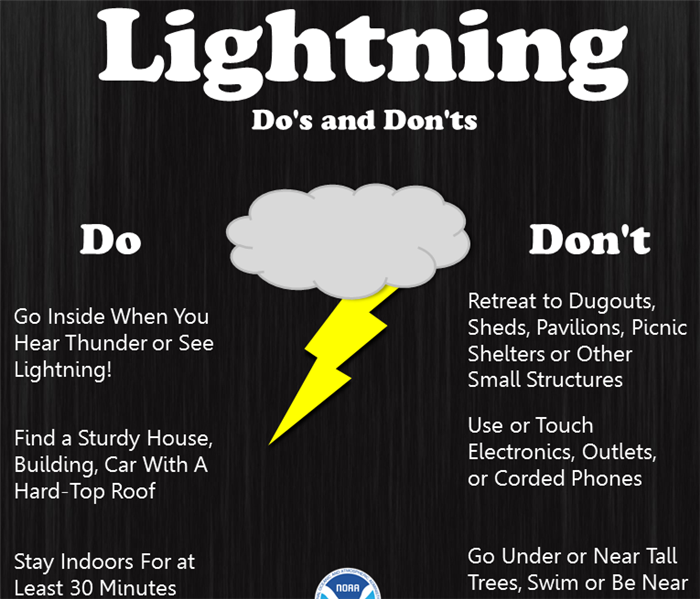When You Hear The Thunder Roar, Head Indoors
6/24/2021 (Permalink)
 Lighting is one of the most deadly weather hazards in Florida, take thunderstorms seriously and follow safety guidelines this storm season.
Lighting is one of the most deadly weather hazards in Florida, take thunderstorms seriously and follow safety guidelines this storm season.
Florida summertime and thunderstorms go hand in hand. Like clockwork every afternoon, Floridians can count on a thunderstorm to roll through as the elements needed to create thunderstorms exist in Florida weather daily. Due to Florida's vulnerability to thunderstorms, and the frequency at which they occur throughout the summer months, lighting is one of the most deadly weather hazards in Florida.
As we head into July, which is both the most active time of year for thunderstorms and the deadliest month for lightning strike fatalities- Florida holds the record for most lighting-related deaths in 2020. Remember that, when thunder roars, go indoors until the storm has passed. Find an interior room on the lowest floor of your home or building. After you find shelter:
- Avoid using or touching electronics plugged into the wall. Lightning can travel through electrical systems and TV systems.
- Avoid plumbing and running water during a thunderstorm, as water acts as an electrical conductor. Do not shower/bathe, wash dishes, etc.
- Stay away from windows and doors, avoid pluming and running water since water acts as an electrical conductor, and avoid touching and using electronics that are plugged into the wall
If you are in a vehicle when a storm approaches avoid driving into severe storms, pull over and wait for the storm to pass. If you get caught in an open area and are unable to get inside or to your vehicle for safety, the following actions can reduce your risk:
- Stay as far away from water and bodies of water such as the ocean, ponds, and rivers
- Never shelter under a tree
- Avoid objects that conduct electricity such as wire fences, power lines
- Avoid elevated areas, but never lay flat on the ground. Instead, crouch down into a ball-like position, keep your head tucked, and hands over your ears. This way you are down low and have minimal contact with the ground.
During the storm, practice the 30-30 rule. After you see lightning strike, begin counting to 30. If you hear thunder before you reach 30, go and remain indoors. Stop all activities for at least 30 minutes after you hear the last roar of thunder.
The storm appears to have passed, the thunder and lighting seem to have stopped. Now what?
Stay informed, continue following local news and weather updates, more severe storms could still be headed your way. Once it is safe and you are positive that the severe weather has passed, you can begin to assess your property for damage. Severe storms produce heavy winds, lightning, and flooding that could lead to fires and damages to your home, causing a need for water and fire restoration services.
If you find that your home has been damaged by the storm and you are in need of fire damage restoration, water extraction, or dry out from water damage or flooding, SERVPRO of St. Augustine, St. Augustine Beach, S. Nocatee and World Golf Village is here to help. We have been helping St. Augustine and surrounding St. Johns County areas with property restoration services, as well as reconstruction since 2015, and have experience working on major storm events. You can count on your local, SERVPRO of St. Augustine, St. Augustine Beach, S. Nocatee and World Golf Village to make it "Like it never even happened."
For more information on storm damage restoration, check out our website here. Or call our office at 904-429-4457, our phone lines are open and ready to respond to emergencies 24/7/365!






 24/7 Emergency Service
24/7 Emergency Service